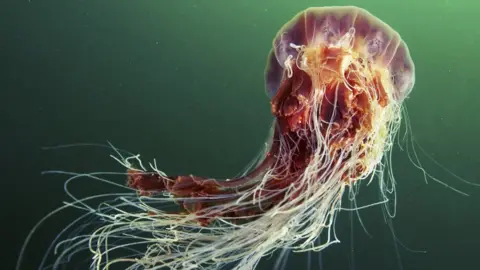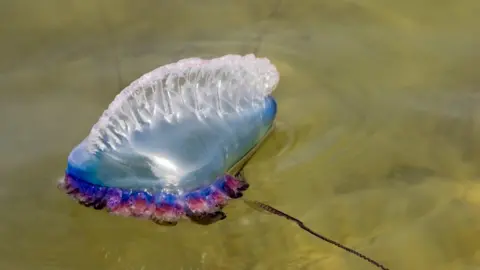Irish scientists test best way to treat jellyfish stings
 ALEXANDER SEMENOV/SCIENCE PHOTO LIBRARY
ALEXANDER SEMENOV/SCIENCE PHOTO LIBRARYMost of us don't venture into the water if there is a chance of a close encounter with a jellyfish.
But they have been abundant around the island of Ireland this year - so do you know what to do if you are unlucky enough to come into contact with one?
You may think you know the best cure. Remember a certain episode of Friends when Chandler and Monica shared more than they bargained for during a trip to the beach?
But - you're in for a shock - that particular treatment only makes the sting worse.
The real cure may involve a dash to nearest chip van.
A new study by scientists from Galway and Hawaii has found that vinegar and hot water are the best combination to ease your pain.
 Science Photo Library
Science Photo LibraryCurrent medical advice suggests vinegar followed by cold water, but earlier this year the scientists discovered hot water worked better when dealing with Portuguese Man of Wars and widened their research.
'As different as a dog and a snake''
"It is often assumed that different types of jellyfish might need different treatments," said Dr Tom Doyle from the National University of Ireland, Galway.
"Well, that was the old paradigm.
"What we, NUI Galway and University of Hawaii, have shown is that vinegar and hot water is the best treatment for three very different jellyfish that are as different from each other as a dog and a snake - the Lion's Mane, the Portuguese Man of War and a Box jellyfish."
The Portuguese Man of War rarely washes up on our beaches, but the Lion's Mane is no stranger to our shores and can be found in popular swimming areas.
"The Lion's Mane has been particularly widespread this year with reports of them washing up all over Ireland," said Dr Doyle.
"In a normal year we get them in Dublin and the north coast only. This year we have many sightings from as far south as Cork and Kerry, which is very unusual."
'Jellyfish Advisory Group'
Dr Doyle and his colleagues from Hawaii wanted to re-evaluate the current first aid recommendations and the use of seawater and urine in treating stings.
Their findings, published in the journal Toxins, found that vinegar was the best non-commercial solution at rinsing the area and removing tentacles.
The affected area should then be immersed in warm water, or a heat pack applied.
"This has an implications for Ireland and the UK as current best practices recommend using sea water and cold packs," said Dr Doyle.
"I hope to meet with the Jellyfish Advisory Group in the coming weeks to discuss our current protocol in light of our new findings."
So, if you are headed for the beach in the coming weeks and know there are jellyfish about, chuck a bottle of vinegar in the car boot.
You may end up smelling like a fish supper, but at least you'll be on the road to recovery.
As for seawater and urine, they were both found to make the stings worse.
Sorry Chandler and Monica - it seems the indignity you suffered was all for nothing.
